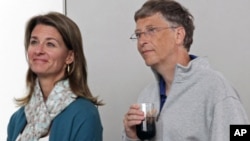The Bill and Melinda Gates Foundation is funding a community radio network in Africa that is aimed at breaking down linguistic barriers between rural communities while improving their communication with decision makers.
Pilot Project - Linking communities
The Pan African Radio Platform pilot project connects broadcasters in Ghana, Senegal, Uganda, and Zambia to give local communities a stronger voice in national development.
The Gates Foundation is funding the program through the PANOS Institute of West Africa. At its launch Friday, the institute's director general, Diana Senghor, said the project aims to improve communication between decision makers and their constituents. “I think the community radio are the only means for the ordinary people to have their say, especially in the local governments without radio stations,” she said.
The project links community radio at local and national levels to produce and exchange programs on development issues. Senghor says those stations have a unique ability to empower local communities.
"Community radio stations can denounce corruption, for instance. They can have groups of people [who are] generally excluded, included for instance women or the young people you have here. So the role of the community radio is really crucial for democracy,” Senghor states.
Removing communication barriers
Ebrima Sillah coordinates the Pan African Radio Platform. He says it amplifies the impact of local-language programming by broadcasting it on bigger stations. "These radio programs will actually be adapted by the mainstream radio and then translated from local languages into national languages," Sillah explaine. "It will mean that an opportunity is given to decision makers to hear the concerns of the local people.”
Sillah says it also aims to breakdown Africa's larger, colonial-language divisions. "Important radio programs that are done in Senegal and are translated into French, for example, can be adapted and, accompanied by the scripts, uploaded on the portal for radio stations, say, in East and Southern Africa to also adapt and translate this into their national languages, for example English, so that then we will break the barriers of linguistics that are the main problem in African radio communications,” Sillah noted.
Sillah says other African radio stations not directly involved in the project will have access to the range of programs produced and posted on the platform portal for download and translation.
With a long-term goal of covering all of Africa, the three-year pilot project aims to broaden the production and exchange of public interest radio content while creating ways for bigger radio stations to directly support smaller programers.




